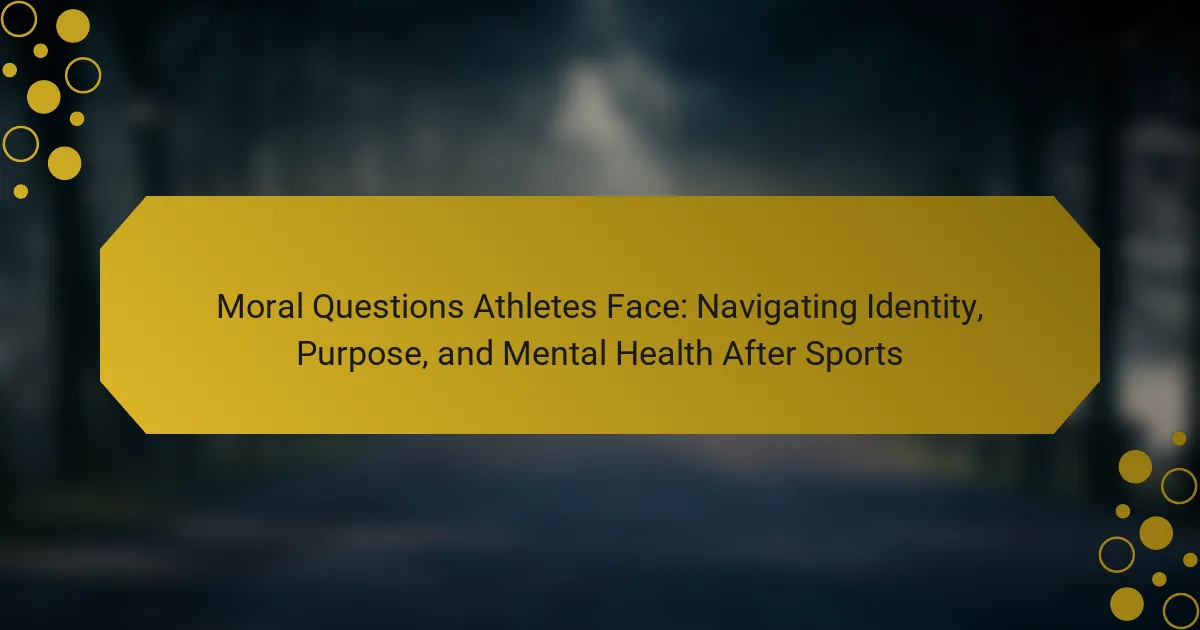Athletes face significant moral questions after their careers, particularly regarding identity, purpose, and mental health. Many struggle with redefining themselves outside of sports, leading to identity crises. The search for new goals can result in feelings of emptiness and depression. Additionally, mental health challenges like anxiety are prevalent, highlighting the need for supportive resources during this transition.

What moral dilemmas do athletes face after their careers end?
Athletes face significant moral dilemmas after their careers, including identity crises, purpose loss, and mental health struggles. These challenges often stem from a sudden shift in lifestyle and societal expectations.
Identity is a core concern; many athletes define themselves through their sport. When that identity fades, they may experience confusion and a lack of direction. A study found that over 60% of retired athletes report feeling lost post-career, highlighting the prevalence of this issue.
Purpose is another critical aspect. Athletes often struggle to find new goals and motivations outside of competition. This can lead to feelings of emptiness and depression. Research indicates that nearly 40% of retired athletes experience mental health issues, emphasizing the need for support systems.
Mental health challenges, including anxiety and depression, can intensify due to the pressures of transitioning to a non-athletic life. Many athletes feel isolated and unsupported during this period, which can exacerbate their struggles. Addressing these moral dilemmas requires comprehensive mental health resources and community support for former athletes.
How does identity shift for athletes transitioning to life after sports?
Athletes often experience a significant identity shift after transitioning from sports to civilian life. This shift can lead to moral questions about purpose and mental health, as their athletic identity may no longer define them.
The loss of a structured environment and team support can contribute to feelings of isolation. Athletes may grapple with a lack of direction, which can impact their mental well-being. Research indicates that nearly 70% of retired athletes report difficulties adjusting to life after sports, highlighting the need for supportive transition programs.
Unique attributes of this transition include the challenge of redefining self-worth beyond athletic achievements. Athletes must explore new passions and career paths to regain a sense of purpose. As a result, mental health initiatives are essential to help them navigate this complex journey and foster resilience.
What role does purpose play in an athlete’s post-career mental health?
Purpose significantly impacts an athlete’s post-career mental health by providing direction and motivation. After retirement, many athletes struggle with identity loss and mental health issues. Establishing a new sense of purpose can alleviate feelings of emptiness and anxiety. Research indicates that athletes who engage in meaningful activities post-career report higher well-being levels. For instance, transitioning to coaching or mentoring can foster a renewed sense of identity. This unique attribute of purpose is crucial in facilitating a smoother adjustment to life after sports.
How can athletes redefine their self-worth beyond competition?
Athletes can redefine their self-worth by embracing identities beyond competition. This shift involves exploring personal values, engaging in community service, and pursuing new passions. Fostering mental health awareness is crucial in this journey. Many athletes find fulfillment in mentorship roles, which can enhance their sense of purpose. Establishing a strong support network also plays a vital role in developing self-worth outside of sports.

What are the universal challenges athletes encounter post-career?
Athletes face significant moral questions post-career, primarily regarding identity, purpose, and mental health. Many struggle with redefining their sense of self after leaving competitive sports. The transition can lead to feelings of loss and confusion, as the structure and validation of their athletic identity diminish.
Mental health challenges are prevalent among retired athletes. Studies indicate that they experience higher rates of depression and anxiety compared to the general population. The lack of a clear purpose after sports can exacerbate these issues, leading to a need for support systems.
Purpose is another critical factor. Athletes often seek new avenues to channel their competitive spirit and drive. Engaging in community service, coaching, or mentorship can provide a sense of fulfillment and redirect their focus.
Finally, navigating relationships can be complex. Retired athletes may face challenges in maintaining friendships and familial connections, as their social circles often revolved around their sports careers. Addressing these moral questions is essential for a healthier transition into post-athletic life.
How does loss of routine impact mental well-being?
Loss of routine negatively impacts mental well-being by increasing feelings of anxiety and uncertainty. Athletes transitioning from competitive sports often struggle with identity loss and purpose, leading to mental health challenges. Research indicates that maintaining a structured daily routine can enhance psychological resilience. Establishing new routines helps athletes adapt and fosters a sense of normalcy, which is crucial for their mental health.
What common mental health issues arise for retired athletes?
Retired athletes often face common mental health issues, including depression, anxiety, and identity crises. Transitioning from a competitive environment can lead to feelings of loss and purposelessness. Research indicates that up to 35% of retired athletes experience significant mental health challenges. These issues may stem from the abrupt end of their sports careers and the struggle to redefine their identities outside of athletics. Support systems and mental health resources are crucial for addressing these challenges effectively.

What unique moral questions arise for athletes in retirement?
Athletes face unique moral questions in retirement, primarily related to identity, purpose, and mental health. Transitioning from a competitive environment to civilian life can create an identity crisis, as athletes often define themselves by their sport. This shift raises ethical dilemmas about self-worth and societal expectations. Additionally, the pressure to maintain a certain lifestyle or image can lead to mental health challenges, prompting questions about authenticity and fulfillment. Athletes must navigate these moral landscapes to redefine their purpose and find balance in their post-sport lives.
How do athletes navigate fame and anonymity after sports?
Athletes often struggle with balancing fame and anonymity after their sports careers end. Many face identity crises as they transition from public figures to private individuals.
The pressure of public scrutiny can lead to mental health challenges, including anxiety and depression. For instance, studies indicate that retired athletes are at a higher risk for these conditions due to loss of purpose and social connections.
Additionally, athletes may navigate their new identities by engaging in community work or pursuing new careers. This shift can help them redefine their purpose and find fulfillment outside of sports.
Ultimately, the journey from fame to anonymity requires athletes to confront moral questions about their identity and the impact of their past on their future.
What ethical responsibilities do retired athletes have towards their communities?
Retired athletes have significant ethical responsibilities towards their communities, including mentorship, advocacy, and philanthropy. They can leverage their platform to inspire youth and promote social causes. Engaging in community service fosters a sense of purpose and identity post-career. For instance, many retired athletes establish foundations to support education and health initiatives. This commitment can enhance mental well-being and strengthen community ties, serving as a model for future athletes.

What rare challenges do athletes face that others may not?
Athletes face unique moral challenges that others may not encounter, particularly regarding identity and purpose after their sports careers. The transition from competitive sports can lead to identity crises, as athletes often define themselves by their performance. Mental health issues, such as anxiety and depression, are also prevalent due to the pressure to succeed and the fear of obsolescence. Rarely, athletes grapple with the ethical implications of performance-enhancing drugs, which can conflict with their moral values. These challenges require athletes to navigate complex emotional landscapes that are less familiar to the general public.
How does the transition from a public figure to a private citizen affect mental health?
The transition from a public figure to a private citizen can significantly impact mental health. Athletes often struggle with identity loss and purpose after leaving the spotlight. This shift may lead to feelings of isolation and anxiety as they navigate their new reality. Studies show that former athletes are at a higher risk for depression due to the lack of structure and support they previously experienced in their sports careers. Additionally, the pressure to maintain a public persona can exacerbate mental health issues during this transition.
What specific instances of moral conflict are unique to retired athletes?
Retired athletes face unique moral conflicts related to identity, purpose, and mental health after sports. These conflicts often arise from the abrupt transition to civilian life, leading to identity crises as they struggle to redefine themselves outside their athletic persona.
Many retired athletes experience feelings of loss and emptiness, questioning their value and purpose once the competitive environment disappears. This can result in moral dilemmas, such as reconciling past behaviors and decisions made during their careers that may now conflict with their current values.
Additionally, retired athletes may grapple with mental health issues, including anxiety and depression, stemming from the pressures of their former careers. The struggle to seek help can create a moral conflict between societal expectations of strength and the vulnerability required to address their mental health needs.
Lastly, the challenge of mentorship can present moral questions. Retired athletes must decide how to use their experiences to guide younger athletes while balancing the desire to protect them from the pitfalls they faced. This dual role can lead to ethical dilemmas regarding honesty and transparency about their own struggles.

What strategies can athletes use to maintain mental health after sports?
Athletes can maintain mental health after sports by adopting strategies such as mindfulness, seeking therapy, and engaging in new interests. Mindfulness practices help manage stress and enhance emotional regulation. Therapy provides a safe space for processing identity shifts and emotional challenges. Exploring new hobbies fosters a sense of purpose and community, which is crucial for mental well-being. Additionally, maintaining social connections with teammates can provide emotional support during transitions. These strategies collectively address the unique mental health challenges athletes face post-career.
How can athletes create a sustainable post-career plan?
Athletes can create a sustainable post-career plan by identifying their values and interests. They should engage in self-reflection to understand their identity beyond sports. Networking with professionals in their desired fields can provide insights and opportunities. Additionally, seeking mental health support can help manage the transition effectively. Establishing a clear purpose and setting achievable goals will enhance their post-sport life satisfaction.
What resources are available for mental health support for retired athletes?
Retired athletes can access various mental health support resources, including counseling services, support groups, and online platforms. Many organizations, such as the Professional Athletes Foundation, offer tailored programs addressing identity and purpose post-career. Additionally, mental health hotlines provide immediate assistance. Accessing these resources can significantly enhance well-being and facilitate the transition to life after sports.
What best practices can help athletes navigate their new identity?
Athletes can navigate their new identity by embracing self-reflection, seeking support, and redefining their purpose. Self-reflection helps athletes understand their values and goals beyond sports. Seeking support from peers, coaches, or mental health professionals can provide guidance during this transition. Redefining purpose involves exploring new passions or careers, fostering a sense of fulfillment.
